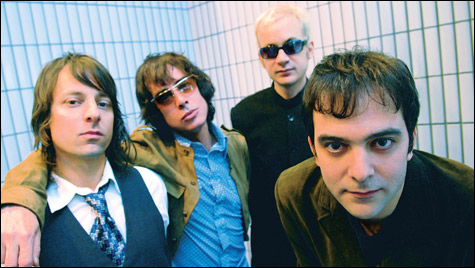
ANOMIE BROTHERS: The price of parody is distance. |
After 11 seesaw years in the pop music marketplace, Fountains of Wayne return on a fourth studio album and third label as an unparalleled American pop-rock phenomenon. The quartet’s music is a golden mean of pop-rock history, as homy and basic as meatloaf made from leftovers (or leftover Meatloaf). But the songs are conceived as sly, terse, open-ended portraits of average Joes and Janes whose lives might be nourished by the same musical leftovers; it’s a black-comic gravy that’s almost as rarefied as the elixir of the Fountain of Youth.
“You know, there’s been so many zillions of records made, the hardest thing to do is figure out something that doesn’t quite sound like anybody else, even though it sounds like it’s maybe influenced by lots of people,” says group co-founder Adam Schlesinger when I reach him by phone at his Manhattan home. “It’s like, you might hear a song that reminds you of, whatever, whether it’s the Doobie Brothers or the Cars or Blondie or the Beach Boys, but you know, maybe we’re singing something slightly different from what you would expect with that kind of musical bed.”

Which is why the first time the chorus kicks in on “Someone To Love,” the bouncy lead single off Traffic and Weather (due this Tuesday on Virgin), something seems slightly wrong — that is, everything is too right. Over a sweet and bouncy dance-rock beat, the verses tell the story of two lonely strangers, Seth Shapiro and Beth Mackenzie (he listens to Coldplay, she watches The King of Queens), but the chorus smoothes it out with the pat hope that “One of these nights/You might find someone to love.” Sure, it fits the music’s cheesy synth-pop brightness to a T, but that’s exactly the problem — it makes the song predictable, campy, as disposable as Eiffel 65’s Italo-disco hit “Blue (Da Ba Dee),” which it vaguely recalls.
It’s not till the last verse that Schlesinger and his mates pull off their “slight difference,” bringing Seth and Beth together in the pouring rain as they try to hail taxis: “Beth Mackenzie sees one just up ahead/She cuts in front of him and leaves him for dead.” The music stops on a drumbeat, the rain softly pours, and then the chirpy synths and “uh uh yeah” background vocals swoop back in for the coda. And suddenly, this familiar musical bed seems as cold and alien as Beth and Seth are to each other.
The point, however, isn’t (just) cruel irony. The details are too tenderly chosen, as when Seth tells his mom he’s fine as she gets a call on another line. And right after the cold slap of “Someone To Love,” the disc moves into more humane terrain as it portrays several clueless males seeking to impress the opposite sex, from a dude souping up his “ ’92 Subaru” to a dude scheming in the DMV line to hit up “Yolanda Hayes” to an anchordude telling an anchorchick they belong together like “Traffic and Weather.” The group’s sizable cult will probably embrace these pop-rock sureshots as fondly as they did the clueless kid who’s got the hots for “Stacy’s Mom” on 2003’s Welcome Interstate Managers (S-Curve). But compared with the 16 tracks on that fantastic predecessor, or the 14 on the quartet’s almost equally masterful second album, Utopia Parkway (Atlantic), the 14 fine-to-excellent numbers on Traffic and Weather suggest that even rarefied elixirs of youth have expiration dates.
For starters, even when they avoid cruel irony, the group’s heavier dose of historical references threatens to tip into parody. “Yeah,” admits Schlesinger, “sometimes if we’re writing something or recording something and it starts to remind us of a certain thing, we’ll go more toward it rather than shy away from it.” This can be fun, for sure. I always find myself waiting for the Billy Joel reference on the rollicking “Strapped for Cash,” and it must have been a blast to have been at the Portland (Oregon) show where the group alternated between their own songs and Billy Joel covers. Schlesinger: “I really don’t know why [we did that]. Billy Joel is just one of those things. I don’t think we ever as a group decided if we like him or hate him, but we know all those songs. So we just can’t stop ourselves . . . it’s like a disease.”
The price of parody, however, is distance, and even when the music circles in more tenderly, its subjects are often fatally distanced from themselves, trapped in a rootless anomie that spins them from one missed connection to another. This theme climaxes with the penultimate number, Schlesinger’s “New Routine,” a tour de force of arranging, producing, and thematic shuttlecock worthy of Babel, and ultimately just as desperate.